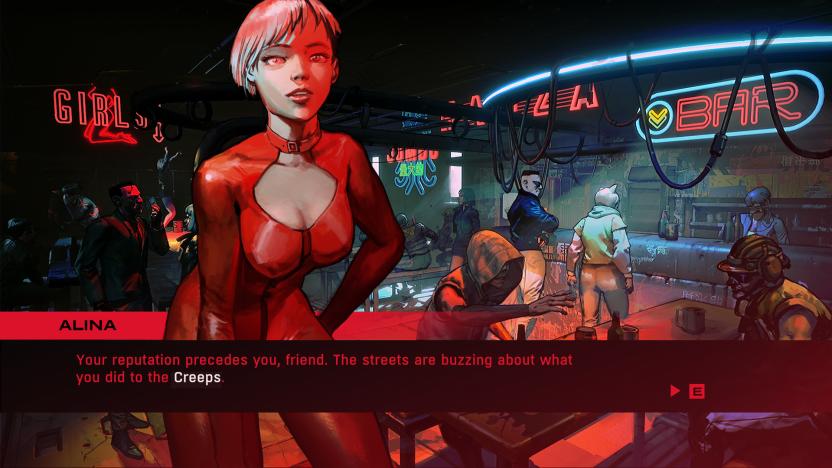williamgibson
Latest

Amazon is turning William Gibson’s ‘The Peripheral’ into a series
It's about time we got a serious attempt at adapting William Gibson's work to the small screen. With the success of Richard K. Morgan's Altered Carbon and Philip K Dick's The Man In The High Castle, streaming studios with an eye on originals can only benefit from Gibson's seminal take on the future. Now, according to The Hollywood Reporter, Lisa Joy and Jonathan Nolan, the creative team behind HBO's Westworld reboot, are taking on The Peripheral, Gibson's 2014 sci-fi thriller, for Amazon Studios.

The evolution of video-game cyberpunk: 'Ruiner' and 'Tacoma'
What does it even mean, cyberpunk?" It's a strange question coming from Magdalena Tomkowicz, the narrative designer of Ruiner, a top-down action game that takes place in an anime-inspired cyberpunk world. It just landed on Steam, PlayStation 4 and Xbox One this week from Polish studio Reikon Games, but fans of gritty sci-fi shooters have been looking forward to this one for months. The thing is, Tomkowicz and Creative Director Benedykt Szneider never intended to create a cyberpunk game. They're simply products of the 1980s, pulling inspiration from their favorite childhood stories -- Alien, Die Hard, Ghost in the Shell -- to create something of their own. Tomkowicz is also a former journalist who covered emerging technology and consumer trends, and her professional curiosity informed Ruiner's aesthetic far more than any desire to re-create the world of, say, Blade Runner. Besides, the traditional Blade Runner version of cyberpunk -- dense, dark city streets coated in smog and grime, eerily illuminated by walls of neon -- is out of touch with today's reality, according to Szneider and Tomkowicz. This aesthetic made sense in the '80s, but sci-fi is all about extrapolating from current technological and social trends, not clinging to 35-year-old ideas about the future. Blade Runner completely missed the advent of cellphones, after all. "It's like it's actually a retro-futuristic genre and something that is locked in its bubble," Tomkowicz says.

Apple: Treating celebs like regular folks since 1976
In my second celebrity-oriented post of the day, we'll explore how Apple treats stars like ... well, like regular people. According to a post on Fast Company, Apple is horrible to celebrities. You see, if you're a major sports figure or a top actress like Snooki, you don't really have to buy a lot of things. Companies love to give you free products so that they can ride your famous coattails to success. That's why if you happen to be blessed enough to walk the red carpet at the Golden Globes or Academy Awards, you'll often find yourself "gifted" with about $100,000 in free products. Well, Apple doesn't need any of that celeb love, much to the chagrin of many stars who lobbied unsuccessfully for Apple schwag. Perhaps the most famous celebrity to beg for an Apple product is NBA legend Shaquille O'Neal, who was quoted as saying "The great Steve Jobs, rest in peace, when the iPhone was first coming out, I used to call him every other day. 'Can I please get one first? Can I please get one first?' He never gave me one. He said, 'Shaq, I can't, I can't, I can't.' He was a great guy." Long-time Apple user and author William Gibson says that "I used to imagine that [Apple] might call me, one day, but I don't think they work that way, and the story about Shaq seems to bear that out!" Bradley Frank, a celebrity publicist with Rogers & Cowen, says his requests to the company for free tech toys have gone for naught: "And when the iPhone 4 came out, I can't tell you how many clients were like, 'We need that early.' And Apple's like, 'No.'" NBA forward Channing Frye of the Phoenix Suns, seems to have Apple's strategy worked out perfectly. Frye, whose cousin works for Apple's marketing division, says "It's just wild how they are so tight-lipped about everything. That makes everyone want it so much more--and the NBA is sponsored by Apple, basically. I've yet to see a player use a PC on the road." When you're standing in line at your favorite Apple Store on Friday awaiting your chance to turn your cash into a new iPad, look around -- you might see a celebrity in line with you.

Cheap electronic skin edges us closer to cyberpunk future
Researchers working for the Department of Energy's Berkeley Lab have figured out how to create relatively inexpensive "electronic skin" comprising carbon nanotubes enriched with semiconductors. Their process involves an enriched single walled carbon nanotube (SWNT) solution embedded in a honeycomb pattern of hexagonal holes to make it more flexible and stretchable - it's so limber, they wrapped it around a baseball, as you can see in the photo above. Combined with inkjet printing of electrical contacts, the technology paves the way for making flexible, wearable computers and a host of other cool things that William Gibson and other cyberpunk authors thought of back in the 1980s: smart bandages, flexible solar cells and electronic skin that can sense touch. Bring on the Zeiss eye implants and neural interface jacks!

William Gibson: We never imagined that AI would be like this
William Gibson, primary philosopher and poet laureate of cyberspace, had an op-ed published in The New York Times recently, where he writes of a force almost beyond comprehension, "a central and evolving structural unit not only of the architecture of cyberspace, but of the world." This is artificial intelligence unlike any we have seen, an organ of global human perception in which we are both the surveilled and the surveillant, what is in essence "a post-geographical, post-national super-state." And what is this force called? That's right: Google.

South Korea seeks to impose gaming curfew, makes computers 'edgy' and 'cool' in the process
Seems like China and the UK aren't the only countries worried about their kid's computing habits. According to the BBC, the South Korean government is currently mulling over plans to regulate just how much time -- and at what time -- kids play video games. It seems that a number of services are ready to follow through with suggestions made by the country's Ministry of Culture, including: Maple Story, Mabinogi (no access granted to school-age gamers between midnight and 8 am) and Dungeon and Fighter (slowing down user's connection after they've been logged in for a certain period of time). Nineteen games are said to be included in total, which is a significant portion of the country's online gaming market. This will inevitably force kids to build their own underground games on disused servers, like Chia and her friends did in William Gibson's Idoru. They'll need to do something with those 1Gbps connections, right?

A tale of two Pico-ITX mods
As William Gibson once wrote, "the street finds its own uses for things." Of course, the future he envisioned was populated by cut-throat characters with names like Dex Cowb0t, mercenary-types who made their money the only way they knew how: with custom cyberspace decks, hopped up on designer drugs like "splurge" and "spazz." What he never understood was that the only true measure of a technology is its ability to aid a bored populace in its pursuit of nostalgia and novelty. And by these standards, the Pico-ITX board might be one of the most important technological breakthroughs of its time (roughly 2007-2010 CE). Where would the hackers and case modders of our humble era be if it weren't for this guy? They wouldn't be shoving PCs into old Game Boy cases, that's for sure. Case in point: the Linksys Bt320g seedbox project places VIA's EPIA PX10000G mobo and a 320GB HDD in an old Linksys shell (and a 400GB HDD in a second router). The man responsible doesn't say whether or not this one was intended to thwart they copyright police in the event of a search and seizure, but on the other hand we're assuming that he isn't going to be seeding OpenOffice on the thing either. If retro computing's your bag, we've found a Timex Sinclair ZX81 case mod that should bring you considerable joy. Unfortunately the membrane keyboard's been disabled, but if you don't mind using a USB keyboard with a machine that originally sported 1KB RAM (at a whopping 3.25MHz), you might want to hit the read link and see how it's done. Read - Linksys BT320G case modRead - Sinclair ZX81 turned into PC



